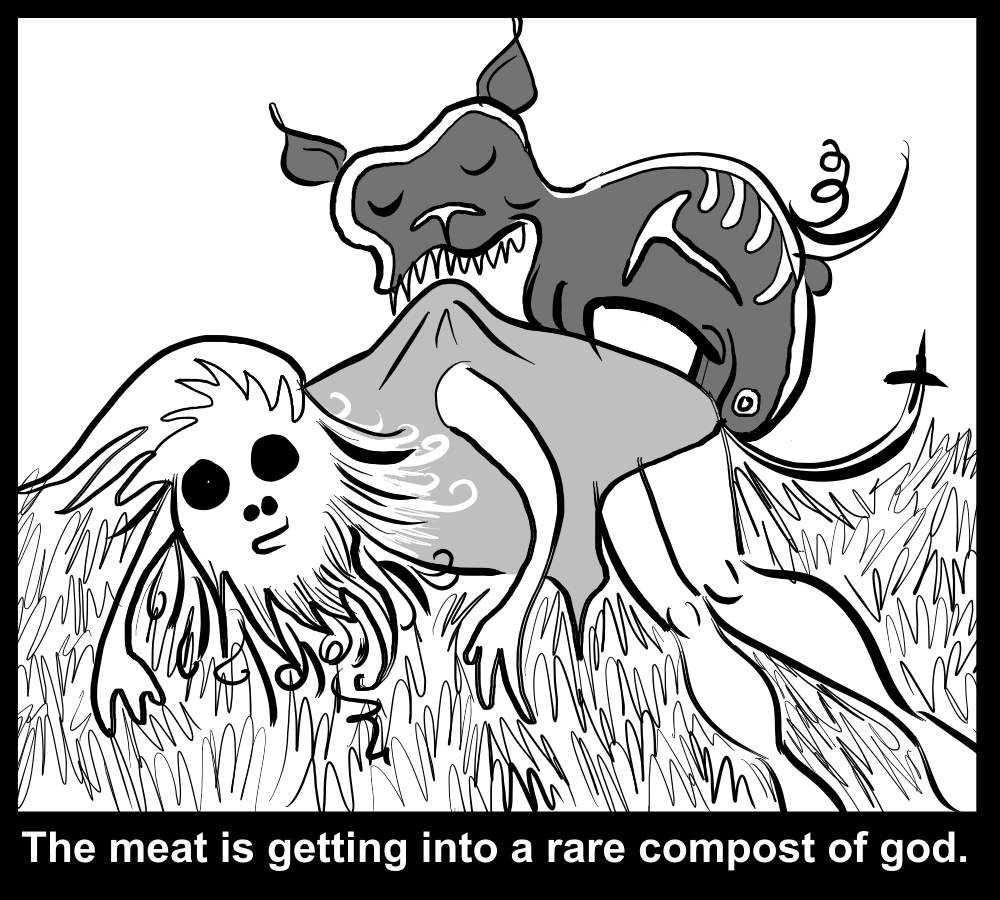{LMC}: Organizing New York Tyrant 3.2

I help to edit one magazine and I am the co-editor of another and I am not sure yet how one organizes such a thing, probably because I haven’t had to actually do it myself yet. The best analogue I know is mix CD’s, which I do make often, and about which I have many specific and strongly held opinions. What goes first in a mix CD? Well you want to put the strongest track first, but here “strongest” has a pretty specific meaning. It should probably be a pretty short song. It should be something with an impeccable sense of rhythm. It should be unbelievably entertaining, charismatic. It should leave the listener, though, with a certain yearning, a hunger for more. And it should also, at the same time, promise more. It should also perhaps be, as an opening gambit, unexpected, surprising. You don’t use the first track from someone else’s album, you probably don’t use the single. Some of these rules have easy analogues in literary magazines. Some do not.
{LMC}: A Brief Reflection on Czar Gutierrez’s Bombardier
You can read a PDF of Bombardier to better participate in the discussion. Go buy NY Tyrant. If you would like to have the full PDF of NY Tyrant 8 so you can participate in this month’s LMC discussions, get in touch with me. But still, when you buy a literary magazine, an angel gets its wings.
The New York Tyrant veers closer to a glossy magazine than most literary journals. The stories are punchy, slim, trim and — with an exception or two — quite small. This is a quibble when you like what you are reading and a relief when you do not. Czar Gutierrez did not just leave me wanting, I was left reeling, holding his strange text up to the stuff I usually like — the Cheever, the Amis, the Ellroy — baffled, going through it line by line, trying to understand why I liked it, and how the hell he managed to jerk me around so much I dug pressure prints into each page.
I am quite suspicious of translations. The ones that wash ashore in the U.S. are tend too often to be finger wagging nuggets of exoticism. The last I remember actually enjoying was Michel Houellebecq. And I should have hated this excerpt of Bombardier — it begins with a trickle of semen dribbling down some poor girl’s thigh, then the camera yanks around to see two planes cross in the sky; then he pulls away further, into pure telemetry and physics… I won’t spoil the rest. Gutierrez’s control is so splendid, his craft so clean and precise, you can ignore the fact that the man is a D.J., a poet, that his website shrieks techno at you as soon as you open it, and the implied quarrel with American military power and 21st Century capitalism (which, honestly, as a Colombian he has a right to quarrel with — we Americans do meddle a bit down there).
All successful magazine brands sell not just stories, but a platonic ideal of taste; a lifestyle, an aesthetic or the appearance of being informed. Literary journals are no different. Each time I pick one up I expect a throbbing, sizzling smorgasbord of discoveries — and for once, in the New York Tyrant, I think I found what I was looking for.
{LMC}: An Illustration of one line from Sean Kilpatrick’s “The All Encompassed Drowned”
Ed: You can read a PDF of this story, here, so you can better participate. Buy NY Tyrant. If you would like to have the full PDF of NY Tyrant 8 so you can participate in this month’s LMC discussions, get in touch with me. But still, when you buy a literary magazine, an angel gets its wings.

What We Talked About This Week in LMC
We kicked things off and got lots of shot outs at awesome places like the LA Times, Bookslut, Omnivoracious, Impose, Bark, and others.
Tom deBeauchamp wrote about Bradford Tice’s How to Be American Boy.
Kevin Lincoln penned a letter to Padgett Powell.
David Peak had some observations about Ken Sparling’s Elrond.
Gian, the editor of NY Tyrant generously made a PDF of NY Tyrant 8 available so anyone can participate in this month’s discussions. If you’d like to access the PDF, you simply have to join the Google Group by sending me a message.
Next Thursday, at 8 p.m. EST, we’ll be chatting with Gian. Come with your questions about NY Tyrant 8! More details, Monday. Mark your calendars now.
Meanwhile, it’s the weekend. Get down with NY Tyrant 8. What piece did you enjoy most in this issue? Why? What piece did you have a problem with? Why? Let’s talk Tyrant.
{LMC} On Ken Sparling’s “What Can the World Do For Elrond?”
Ed: You can read a PDF of this story, here, so you can better participate. Buy NY Tyrant. If you would like to have the full PDF of NY Tyrant 8 so you can participate in this month’s LMC discussions, get in touch with me. But still, when you buy a literary magazine, an angel gets its wings.
“My life comes in bits, fragments, brief paragraphs, and sometimes a page or two, so it makes sense that this is my unit of storytelling.”
Sparling drops this quote in an interview conducted by Michael Kimball, published in The Faster Times (read the whole thing here), and it’s a wonderful distillation of his technique, even more appropriate in its very succinctness.
He goes on: “It isn’t so much that the storytelling units are small in my books, more that they don’t seem connected, they don’t seem to relate to each other. There seems to be no rules for what happens after a reader encounters an expanse of white space and moves onto the next little bit. Whatever it is that sustains each individual section seems to break down as soon as a section ends.”
{LMC}: A Letter to Padgett Powell, From the Famed Autodidact Lonny Nilsson
Ed: You can read a PDF of this interview, here, so you can better participate. Buy NY Tyrant.
Man, Powell, you are a redneck savant.
Powell, I’m writing to you about your interview with a Jacob, Jacob White. You know, you can say he’s a Jacob, because there’s a many Jacobs in the world, just as there are a many pitbulls that’ll kill your littler dogs, as you so say. But can we correctly say you’re a Padgett? I’m not so sure. I mean, you are a Padgett, don’t get me wrong, but to say so seems a mite disingenuous, as though I were to say you are a three-headed rattlesnake: You’re probably more the three-headed rattlesnake.
Powell, I called myself a famed autodidact in the title of this letter because you put a pressure on me, in your skills. You put a pressure on all of us. You’re a writer in the mold of writers who do things other than write—a practical mode, this is. In the shadow of your many voices, many minds and many habits, I call myself an autodidact, and I do try—but crafts seem to wither at my touch, you know, as though I’m a wrecking ball come to break things down rather than put them together, and I can’t hardly overcome my big iron-spherical nature. But hey.
Powell, we don’t send half-enough letters these days, and at the beginning of this compilation-of-many-sorts you are in, this New York Tyrant 8, sort of diverse in that way you are diverse, there’s a letter unsent from the great West Virginian Breece D’J Pancake to his mother, in which he dreams double-layered about a strange kind of deathless yet skeleton-haunted world. If a letter, even unsent, is good enough for Pancake, it’s better than me, and hopefully better for me, than to continue trying to fish and hunt and roof in your image and keep hooking my buddies, jamming my gun, falling through the ceiling like the paralyzed man on his pallet in Mark, sans rope and pulleys.
{LMC}: On Bradford Tice’s “How to Be an American Boy”
Ed: You can read a PDF of this story, here, so you can better participate. Buy NY Tyrant.
Even with broken parts, you can build a functional machine. Take a bent manifold, a rusty chain and suddenly you have a robot that walks only into walls, a radio playing only silence, furniture that won’t talk. Likewise, some writer’s can weld together adolescence’s great banalities, its cliches and tritenesses, into really satisfying fiction. Bradford Tice’s “How to Become An American Boy,” an awkwardly told coming-out tale of one queer youth in flyover U.S.A., is a perfect example.
From the title on, the story begs for derision. It is broken into eight segments, four goals (with titles like “Goal Three: Find a male role model” and “Goal Four: Be Stoic in the Face of Disaster”), each followed by a “Self-Actualization Scene.” To enhance the general PSA atmosphere, each of the Goal segments takes place primarily in a psychiatrist’s chair. There’s a shadowy expectation of hate crimes or sexual violence. Moreover, it’s written in the second person future. That “You” is the main character, and that this is the story of what “You” will do, could almost justify total dismissal of the work, but, happily, that reaction is precisely the gasoline on which this machine runs.
{LMC}: And So We Begin

I’ve written quite a few times about how lamentations and garment rending over the death of literature, the literary, publishing, and the written word have been premature. No one can dispute that the publishing industry is changing, that our culture is evolving, that we are facing certain challenges when it comes to encouraging the general public to read when, it would seem, people would rather watch television or stare at the Internet, or do anything but read. A difficult path, however, is not an impassable one.
Publishing is dying! Publishing is dying! Publishing is dying! Go ahead, say it three times. You’ll feel better but chanting those words will not nor cannot make them true.
We have a fetish for sifting through the proverbial ashes of publishing, the age of letters, a culture of intellect, as if all hope is lost, as if all we have left is the faint memory of a time when we sat in parlors on velvet lined couches and discussed literature while smoking tightly rolled French cigarettes. We sniff with disdain when confronted with mass market paperbacks or pablum like Jersey Shore and big budget films that inexplicably gross $50 million (ahem, Jackass 3D). These “cultural abominations” (which are, in fact, not abominations at all) are more than some of us can bear. We begrudge their existence as if they are taking the place, in our hearts and minds, of the next staggering work of literary genius. We blame these distractions for the demise of all things literary and intellectual as if we must choose between the charms of The Situation and Snooki or Johnny Knoxville and the charms of, say, Adam Levin or Jonathan Franzen or Marcy Dermansky or Grace Krilanovich. I’ve said it before, but I will say it again—I choose both.
